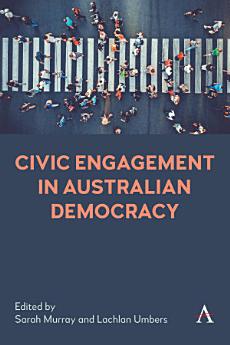Civic Engagement in Australian Democracy
Sarah Murray · Lachlan Umbers
maj 2025. · Anthem Studies in Australian Politics, Economics and Society 1. knjiga · Anthem Press
E-knjiga
234
Broj stranica
family_home
Prihvatljiva
info
reportOcjene i recenzije nisu potvrđene Saznajte više
O ovoj e-knjizi
The Australian democratic system has long been regarded as one of the most stable and predictable in the world, with an entrenched two-party duopoly, compulsory voting ensuring high levels of electoral participation and relatively high levels of satisfaction with the democratic process. Yet the ways Australians engage with, and participate in, their democracy have shifted substantially in recent times. While a record proportion of Australians are now on the electoral roll, less than 1% belong to a political party, and the share of Australians that have always voted for the same party in Federal elections has declined from 72% in 1967 to 37% in 2022. Turnout in the 2022 Federal Election fell below 90% for the first time since the introduction of compulsory voting in 1924. Over 50% of voters cast their ballots early in 2022, up from around 10% in 2004. The advent of social media has afforded Australians a range of opportunities for political engagement but has also given rise to serious concerns surrounding the dissemination of misinformation. And Australians have also recently been afforded several historically rare opportunities for direct participation in the lawmaking process – particularly, the 2017 same-sex marriage plebiscite and the 2023 referendum on the Aboriginal and Torres Strait Islander Voice to Parliament.
These developments give rise to a wide range of deep, difficult questions for Australian democracy, many of which have been under-explored. What, for instance, does the failure of the referendum on the Aboriginal and Torres Strait Islander Voice to Parliament mean for Australian democracy? What sorts of opportunities ought to be afforded to Australians for direct participation in government? How might climate change impact Australian democracy in the coming decades? How might the rise in early voting impact the character of Australian democracy? What opportunities do Australians have for engagement in civic life, and what obstacles do they face in exercising them?
This edited collection brings together specialists in the democratic process to consider such questions, alongside many others. Moreover, the collection is uniquely interdisciplinary, insofar as the contributors are drawn from a diverse range of fields – law, philosophy, political science and sociology. The chapters each help bring us a broader understanding of civic participation in Australian democracy, in order that we might evaluate the status quo, and gauge where it might be headed, in the future.
These developments give rise to a wide range of deep, difficult questions for Australian democracy, many of which have been under-explored. What, for instance, does the failure of the referendum on the Aboriginal and Torres Strait Islander Voice to Parliament mean for Australian democracy? What sorts of opportunities ought to be afforded to Australians for direct participation in government? How might climate change impact Australian democracy in the coming decades? How might the rise in early voting impact the character of Australian democracy? What opportunities do Australians have for engagement in civic life, and what obstacles do they face in exercising them?
This edited collection brings together specialists in the democratic process to consider such questions, alongside many others. Moreover, the collection is uniquely interdisciplinary, insofar as the contributors are drawn from a diverse range of fields – law, philosophy, political science and sociology. The chapters each help bring us a broader understanding of civic participation in Australian democracy, in order that we might evaluate the status quo, and gauge where it might be headed, in the future.
O autoru
Sarah Murray is a Professor at the University of Western Australia Law School and is an expert in constitutional law and electoral law, court innovation and community justice centers.
Lachlan Umbers is Senior Lecturer and Chair of Philosophical Studies at the University of Western Australia. He works primarily in moral and political philosophy, with a particular focus upon issues in democratic theory and climate justice.
Ocijenite ovu e-knjigu
Recite nam šta mislite.
Informacije o čitanju
Pametni telefoni i tableti
Instalirajte aplikaciju Google Play Knjige za Android i iPad/iPhone uređaje. Aplikacija se automatski sinhronizira s vašim računom i omogućava vam čitanje na mreži ili van nje gdje god da se nalazite.
Laptopi i računari
Audio knjige koje su kupljene na Google Playu možete slušati pomoću web preglednika na vašem računaru.
Elektronički čitači i ostali uređaji
Da čitate na e-ink uređajima kao što su Kobo e-čitači, morat ćete preuzeti fajl i prenijeti ga na uređaj. Pratite detaljne upute Centra za pomoć da prenesete fajlove na podržane e-čitače.





